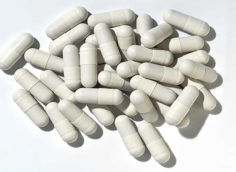The High-Fiber Fallacy
"If you want to lose fat you must eat truckloads of vegetables." That's what diet experts say.
Sounds like the most logical strategy in the world, doesn't it? Vegetables are lower in calories and take up more space in the stomach. They can displace the calories you'd otherwise get from crappy foods. It's part of the reason diets like "The Whole30" and "Paleo" work well for so many.
The problem? Slowed gut motility (movement of poo through the intestines) and all of the lovely symptoms that come with it, like a distended stomach and abdominal pain.
If this problem doesn't sound familiar, consider yourself lucky. You'll likely succeed on a diet packed with fibrous vegetables. But a growing number of people are finding that this every-meal-is-a-salad approach is ironically making them stopped up and wider in the waistline.
The same experts that recommend a high-fiber diet are often the first to tell you that you'll need a litany of gut tests because the problem must be YOU, not the diet. But regardless of what the tests show, the solution may be the same.
If your digestion gets worse with more fiber, then it'll likely get better by reducing your fiber intake. Crazy idea, I know.
A Recent Stool Study
Researchers studied 63 people who struggled with constipation. The subjects were instructed to eliminate fiber from their diets for two weeks and then to reintroduce it to an acceptable level. Then, at one month and six months, the researchers measured participants' dietary fiber intake, as well as these crappy symptoms: difficulty pooping, abdominal bloating, and abdominal pain.
At the six-month mark, 41 subjects chose to remain on a no-fiber diet, 16 upped their fiber minimally but stayed on a reduced fiber diet, and 6 of them went back to a high-fiber diet.
The Results
- Those who went back to a high-fiber diet struggled with constipation again.
- Those who continued with a reduced or no-fiber intake drastically improved their gut motility.
What To Make of This
Conventional wisdom says that upping your fiber will increase your frequency and ability to poop, but that's not the case for everyone. Slowed gut motility is a common problem for those who eat diets filled with fibrous vegetables. And if your motility comes to a stop, your belly will protrude, no matter how lean you are.
So pay attention to your gut. Pooping shouldn't be difficult, painful, or infrequent. If you're having fewer than three bowel movements a week, doctors call that constipation. And if you look 6 months pregnant when you're relatively lean and not in the baby-making business, then reassess your fiber intake.
Lower Fiber Volumization
If you don't struggle with constipation, then knock yourself out with salad. I'm a huge proponent of volumization – eating foods that fill you up with fewer calories. Just remember it's possible to volumize food without going crazy on fiber.
How? Get plenty of protein. Consider veggies like zucchini, cucumber, all sorts of cooked winter squash (acorn, butternut, etc.), okra, mushrooms, asparagus, and tomato.
If you're wanting to switch to a low-fiber diet but you're worried about getting enough nutrients, try a greens supplement like Superfood which will get you the phytochemicals your body needs without the fiber that makes you look tubby.
Reference
- Ho, Kok-Sun. "Stopping or reducing dietary fiber intake reduces constipation and its associated symptoms." World Journal of Gastroenterology, vol. 18, no. 33, 2012, p. 4593., doi:10.3748/wjg.v18.i33.4593.





